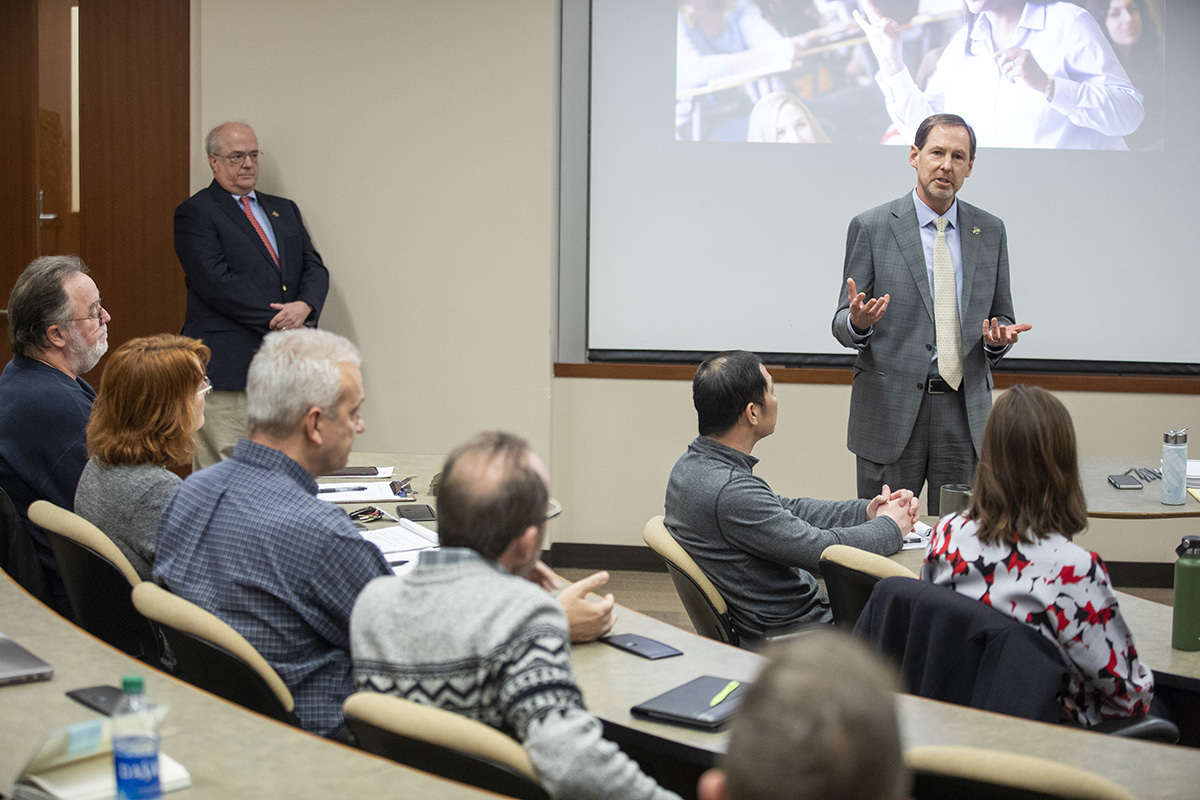Annual inclusive classroom training for faculty is underway
Author: Jeff Budlong
This is an archived story. The content, links and information may have changed since the publication date.
Author: Jeff Budlong

Senior vice president and provost Jonathan Wickert (right), speaks to Ivy College of Business faculty at the outset of the inclusive classroom workshop delivered by CELT staff on Jan. 10. David Spalding, Raisbeck Endowed Dean of the Debbie and Jerry Ivy College of Business (left), also listens. Photo by Christopher Gannon.
With a new semester underway, faculty leading classes will find themselves in the same seats as their students as part of training to enhance their ability to create inclusive classrooms.
President Wendy Wintersteen outlined 10 actions in November to addresses racism and discrimination on campus in response to concerns from Students Against Racism. Among them is annual training for faculty focused on inclusive teaching in class. The Center for Excellence in Learning and Teaching (CELT) uses its inclusive classroom workshop as the basis to conduct training, which began last week.
"The purpose of a land-grant institution is to educate our students, and part of education is feeling like you belong," CELT director Sara Marcketti said. "You really can't learn something if you feel like you are on the outskirts and you don't matter. We all have a responsibility to help one another."
Senior vice president and provost Jonathan Wickert told the inaugural group, the Ivy College of Business' management department, the training is designed to help instructors better understand students.
"Fifty years ago, we had 277 multicultural students on campus," Wickert said. "Today, international students make up a quarter of our campus.
"Times are different. Look at the demographic shifts and changes happening in the Midwest. That shift is going to continue and our campus will continue to become more diverse. One of the things we do at universities is learn and improve, and that is really what the inclusive classroom program is about."
All 56 academic departments must complete the training by June.
"Our initial inclusive classroom training was three hours long, but we want this to be a good baseline focused on an active learning approach," Marcketti said. "Departments can decide if they want one, two or three hours."
Marcketti, CELT program coordinator Laura Bestler, four CELT faculty fellows and a training specialist not yet hired will conduct this year's training.
The goal of the workshop is for participants to understand why teaching inclusively is important and to identify course-specific improvements that can be made to encourage inclusiveness.
The workshop begins with a 15-minute presentation. Then for the remainder of the time together, participants reflect on their teaching methods and they discuss three areas of inclusive teaching:
Participants are given time to think about each area before sharing ideas with a partner and discussing ideas with the group. The large group element allows participants to bring examples of situations they have faced in the classroom and to learn from each other.
"It is very constructive. It is about things you can do, and it is about how you structure classes," said Brad Shrader, University and Morrill Professor of management. "They covered a lot in a short amount of time."
Although the training is yearly, the information will rotate on a four-year cycle of topics:
The training uses a flipped classroom approach that starts before participants attend a workshop. Everyone must complete three online modules available in Canvas that take about an hour to finish:
Faculty are able to confidentially provide feedback after completing the modules. Many have found them helpful and informative through comments they have shared, Marcketti said.
"I wasn't aware of the goals of a land-grant institution," a participant said. "I now recognize our duty to help those who might not have experienced diversity before to see the value in what everyone can contribute and truly appreciate diversity."
Attendance at a workshop is mandatory and tracked by department chairs. Faculty or staff unable to attend a workshop with the rest of the department can join another department in their college. College deans will send annual participation reports to Wickert.
Each department is led by a faculty facilitator who works with CELT to arrange training, including finding a space large enough to accommodate the group.
Currently, 47 departments have scheduled training. Facilitators also are encouraged to join a monthly learning community that will be formed and open to everyone on campus.
To ensure training remains effective, CELT will create an inclusive classroom advisory committee.
Each workshop participant also is asked to fill out an evaluation form on the training to make sure the most pertinent information is taught.